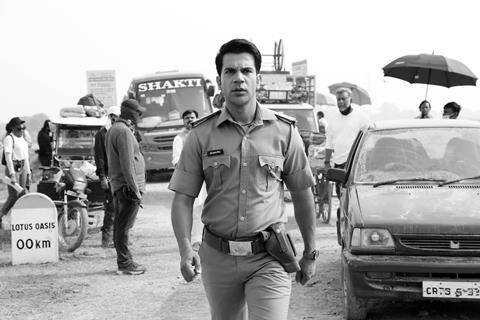Anubhav Sinha’s black-and-white drama takes an unflinching look at India’s Covid-19 migration crisis

Director: Anubhav Sinha. India. 2023. 114minutes
There’s no denying the fact that Anubhav Sinha has been audacious in choosing to make a film on the critical issue of enforced mass migration of India’s working class—from big city workplaces back to their home towns and villages—during the first wave of Covid-19 in 2020. The sudden imposition of lockdown and border closures, ostensibly to contain the spread of virus, economic cutbacks, lack of jobs and wages and administrative apathy, had made it impossible for people to survive in the urban jungles; a horrifying reality worth documenting many times over in cinema.
What Bheed might lack in depth and nuance, it makes up for with an underlying sense of urgency
Controversy erupted online in the wake of Bheed’s first trailer, in which Sinha compared India’s class, caste and religious divides of Covid-19 with the Partition of 1947. Dialogue cuts imposed by the country’s Central Board of Film Certification — including the removal of a voiceover by Prime Minister Narendra Modi announcing the lockdown — have diluted those comparisons, and resulted in some obviously jagged storytelling which can only provoke sympathy for Sinha over the loss of his original vision. Yet it remains to be seen whether even this truncated version may still be too discomforting for some viewers. The film’s performance won’t just determine Bollywood’s financial muscle but will also be a measure of the nation’s collective memory of its own recent past.
Bheed – a Hindi word which translates to ‘crowd’ – is poised, a tad lumberingly, between the real and the fictional. On one hand it recreates some real-life incidents, straight from the news headlines, with very little creative imagination, ingenuity or nuance but a distinct sense of emotional manipulation. Such moments include the tragic deaths of tired workers sleeping by the railway tracks, while others are fumigated en masse against the virus near the state borders.
On the other hand, there is a focus on a group of fictionalised characters and multiple narrative strands—not all of them evenly handled—that collide at a police checkpoint. The theme unifying all these subplots is that of the endemic social fault-lines, the multi-hued differences and divisions captured ironically through a black and white palette.
A group of Hindu security guards and their families, led by Trivedi (Pankaj Kapur), is suspicious of the Muslims, thinking of them as Covid super-spreaders. A well-heeled lady (Dia Mirza) in her fancy car jokes heartlessly about the presumed immunity of the poor. A bunch of cops, in charge of the post, are seemingly empowered by their uniforms, but still battling caste-based prejudices in their own lives. A young idealistic journalist Vidhi Prabhakar (Kritika Kamra) and her cynical photographer colleague (Karan Pandit) argue about the state of the nation while documenting the ongoing human exodus.
The subplot involving the policemen captures the most attention, more so because of the persuasive ensemble of actors including Ashutosh Rana and Aditya Srivastav. Rajkummar Rao is particularly riveting as young cop Surya Kumar Singh who hides his surname and identity and is fighting the demons of the caste system — not just in the world outside but the anxieties entrenched deep within himself while trying to find poise and equanimity in his relationship with upper caste doctor Renu Sharma (Bhumi Pednekar).
The film might kick off with a focus on the migrant workers, but their plight is better grounded in the background song ‘Hirail Ba’ than the film itself. The administrative apathy towards the dispossessed may not be openly critiqued, but is a perennial silent backdrop against which the action unfolds. In fact, the very absence of any form of State help becomes an unwitting comment, especially in ironic juxtaposition against a righteous remark about ‘Incredible India’. What Bheed might lack in depth and nuance, it makes up for with an underlying sense of urgency and a righteous call for overhauling the justice system by handing it over to the poor and the powerless.
Production company: Benaras Media Works
International distribution: Reliance Media, re.info@relianceada.com
Producer: Anubhav Sinha
Screenplay: Anubhav Sinha, Saumya Tiwari, Sonali Jain
Cinematography: Soumik Mukherjee
Editor: Atanu Mukherjee
Production Design: Nikhil Kovale
Music: Anurag Saikia
Main cast: Rajkummar Rao, Bhumi Pednekar, Ashutosh Rana, Pankaj Kapur, Aditya Srivastav, Kritika Kamra, Dia Mirza, Sushil Pandey
























